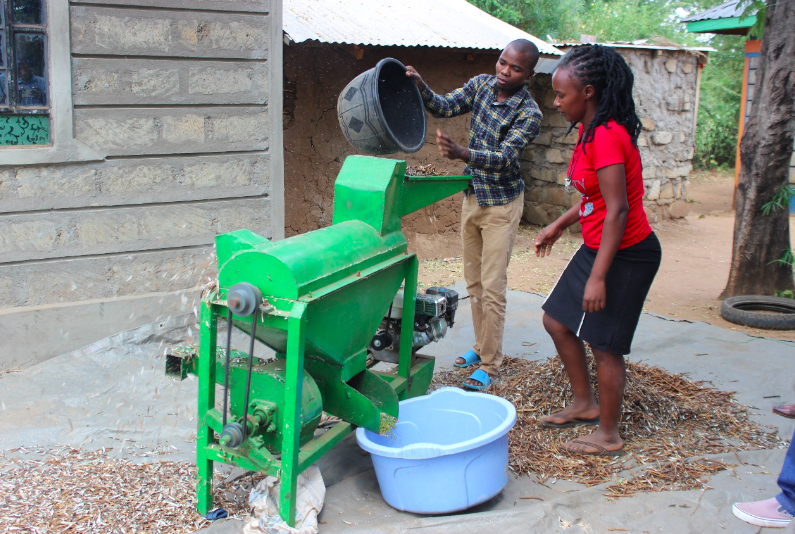 Joel Kithetu, a trainer of trainees, and Rachael Makena, threshing green grams at Ntoloni village on June 17, 2025. Photo/ Munene Nyaga.
Joel Kithetu, a trainer of trainees, and Rachael Makena, threshing green grams at Ntoloni village on June 17, 2025. Photo/ Munene Nyaga.
Mukothima, a
location in Tharaka Nithi County, sits quietly deep within the semi-arid
midland zone of Eastern Kenya.
It is
home to three enterprising youth,
Rachael Makena (26), Joel Kithetu (29), and Doris Makena (24) who farm sorghum, green grams and pearl millet.
Despite Mukothima’s challenging climatic conditions, marked
by delayed rainfall, early cessation and irregular distribution, the trio has
defied the odds to consistently produce bumper harvests.
Doris
recounts her journey from a financially struggling housewife to a thriving
agripreneur within just two planting seasons.
“I used to stay at home, fully dependent on my husband and
life was extremely tough. He did manual jobs to support our two children, but
it was never enough,” she stated.
Her turning point came in early 2024 when a friend
introduced her to farming. She ventured into sorghum farming on a leased one-acre plot in Kitithini in
Mukothima. However, her first season was unsuccessful due to lack of knowledge
and skills.
Her breakthrough came through Drought Tolerant Crops (DTCs)
4 Youth Jobs Creation Programme,
that equipped her with certified seeds and training on the best farming
practices.
The programme
aims at empowering at least 120,000 rural youth 70 per cent being women, 30 per cent
young men and also looking to reach five percent of people living with disabilities through scaling
drought resilient crop technologies to create dignified and fulfilling work
opportunities.
For Doris,
the programme proved
transformative and by June 2024, she harvested 408 kilogrammes of sorghum, projecting to Sh40,800, her first
significant income from farming.
Doris
has also experienced a change with her relations, whereas in the past they
would not include her in social gatherings because she had nothing to
contribute, she is now called on regularly. “Now I am constantly invited for
‘Kiathi’ and I show up looking smart and contribute financially,” she chuckles.
The proud mother of two, a grade two pupil and a
six-month-old infant, she has since expanded her efforts by leasing two more
one-acre plots that she targets reaping at least Sh145,000 in the current and
her second season.
For Rachel Makena, from Rukani village in Mukothima, the journey from subsistence
farming to agribusiness success is one she tells with pride. A beneficiary of
the same programme, Rachel now owns a piece
of land she purchased after selling her harvest a milestone she once only
dreamed of.
Through the cultivation of sorghum, pearl millet, and green
grams, Rachel not only bought a freezer worth Sh20,000 but also started a milk
retail business in her shop at the nearby Ntoloni market. Her transformation
has been impressive. With profits from her milk venture and savings from
farming, she recently bought a plot of land for Sh80,000 and plans to develop
it soon.
“I joined the DTCs programme in 2024, and since then, my farming has improved
tremendously,” she said. “I used to lease just half an acre. Now, I’m working
on four acres and the latest one I leased this year.”
After receiving certified pearl millet seeds, Rachel
harvested 12 sacks, earning her Sh71,000. A mother of two, she now targets at
least Sh100,000 from the current season to help fund her dream of owning a
home.
“I’ve already threshed four 90kg bags, and more harvest is
still in the field. I’m expecting about Sh46,000 from green grams and over
Sh60,000 from cow peas
the entire season,” she added.
According to the Kenya National Bureau of Statistics (2023),
agriculture contributes 21.8
per cent of the GDP and employs over 40 per cent of the national population, 60 per cent in
rural areas.
In Ntoloni village, about five kilometres from Rukani, another success story is taking shape. Joel Kithetu proudly stands beside his newly built three-bedroom stone house. His breakthrough came after joining the programme in 2023 as a trainer of trainees.
“Before the programme, I was farming one leased acre and struggling to get any
meaningful harvest. Hitting ten bags was a miracle. After joining the program
and receiving certified seeds and skills training, everything changed,” he
said.
Now, Joel leases three acres, producing an average of 24 bags of 90kg per season translating to around Sh200,000.
A procurement graduate, he credits his farming income for enabling him to complete his house, a project he had nearly abandoned due to financial constraints.
“I’ve spent Sh1.8 million on the construction, with
Sh500,000 coming directly from farming sorghum, pearl millet, and green grams
over the past three seasons,” Joel shared.
The DTC programme operates in 10 counties, focusing on value chains of sorghum, finger millet, pearl millet, and green grams, particularly in Meru and Tharaka Nithi counties cultivating more than just crops, but futures too.












